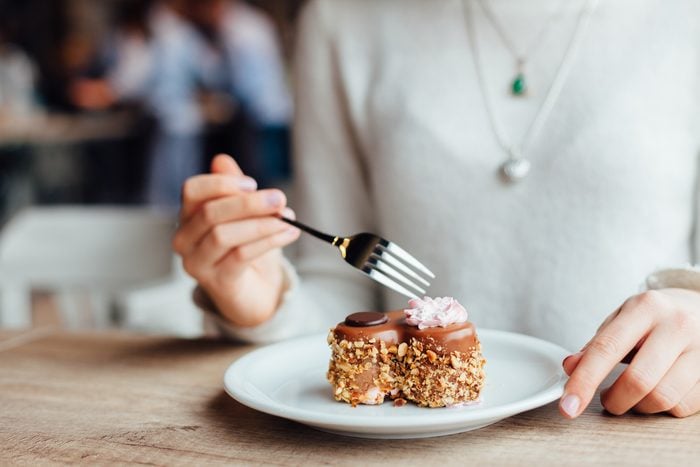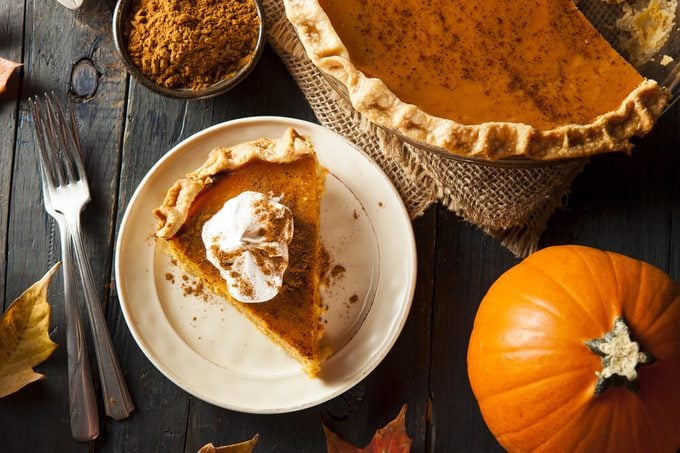Why You Should Never Comment on Weight or Eating Habits at Thanksgiving
Updated: Nov. 19, 2021

The number of people who are grateful for unsolicited comments about their food intake or body is... pretty much zero.
When you sit down for Thanksgiving dinner, it can sometimes feel like a challenge to find a safe topic of conversation. Most people know by now that certain subjects (politics, we’re looking at you) are best avoided to preserve family harmony. While food might seem to be the perfect conversation starter on a holiday dedicated to yummy comfort dishes, it’s a good idea to move comments about body size, dieting, weight loss, or food intake to the no-fly zone.
We’re talking about comments like :”Should you really be eating that?” “I thought you were on a diet.” “I wish I could eat dessert at every meal like you.” “Is there a baby in that belly or just beer haha!” “You must have a slice of Grandma’s pie.” or “You’re so skinny, I admire your willpower.”
These comments, and the many, many others like them, are often made under the guise of being helpful, caring, or as attempts at humor—and the holidays are prime time for “humor” that is anything but funny. In fact, what’s really happening is body shaming, food bullying, or both—two behaviors that are unfortunately still common, says Alisa Ruby Bash, PsyD, a psychotherapist in Beverly Hills, California. At best these comments fall flat but they can also be internalized and cause ongoing pain to the receiver, she says.
“Telling someone to eat when they’re not hungry, shaming them for eating something you don’t approve of, making fun of someone’s eating habits, or critiquing their body can all be a type of emotional abuse,” she explains. (If you’re on the receiving end of these comments here are the 15 best responses to body shaming.)
Plus, if you think you’re doing it to be helpful, know that it doesn’t work: Research suggests that people whose loved ones try to shame them into losing weight “for their health” not only don’t lose weight, but may have worse mental and physical health. For example, a 2017 study of 159 overweight people in the journal Obesity found that people who had internalized weight bias didn’t lose more weight than other people. What they did end up with, however, was an increased risk for cardiovascular and metabolic problems. A 2018 study notes that young adults who feel body shame are more likely to be depressed than those who do not.
But if that’s not enough to convince you to stop commenting on people’s food or bodies this holiday season, we asked experts to share all the reasons you need to cut it out immediately:
You don’t know the whole story

People make snap judgements about other people’s food not realizing that they are only seeing a moment in time, not the full picture, says Michelle Pillepich, MPH, a registered dietitian in Ramsey, New Jersey, who specializes in eating disorders. For instance, that person may be struggling with a medical condition that affects their weight or the types of foods they can eat. Or perhaps they are on a diet, trying to lose or gain weight. Commenting on what they’re eating can make them feel self-conscious and judged—and this includes comments that you think are complimentary, she adds. “Even saying something with good intentions, like, ‘You’re so good not to get dessert’ can trigger painful emotions,” she explains.
You could trigger someone’s eating disorder

For people with an eating disorder—including anorexia, bulimia, and binge eating—holiday buffets can be a minefield, and sometimes all it takes is a thoughtless comment to make it blow up, Pillepich says. “I have heard from many clients that they received comments of praise for their weight loss when they were in fact in the depths of an eating disorder,” she says. “This only reinforced the harmful behaviors of food restriction.” Commenting on someone’s plate or body size can also trigger feelings of shame that can lead to a binge later on. If you’re truly concerned about a loved one, keep quiet about their eating habits but do be on the lookout for the seven silent signs of an eating disorder.
It teaches people not to trust their own body’s signals

Paying attention to satiety by only eating when hungry and stopping when full is a crucial life skill for maintaining a healthy weight and a good relationship with food, not to mention one of the things mindful eaters try to do. Unfortunately many adults have learned to ignore their own feelings—often because of well-meaning comments from family or friends, says Madison Surdyke, a certified Integrative Nutrition Health Coach and counselor in Dallas, Texas. “When you say something like, ‘OMG you’re getting seconds?’, it discourages that person from listening to their body’s internal signals like hunger, fullness, and satisfaction,” she explains. “These are unique to each person so you can’t possibly know if someone else is feeling hungry still.”
It can make you feel worse about yourself
Being so interested in what other people are eating (or not eating) can be a sign you’re trying to avoid or minimize your own issues with food, Surdyke says. “When you comment on other people’s food and bodies, you get to avoid your own issues because it has nothing to do with them and everything to do with you,” she says. “When we struggle with food and our bodies ourselves, it’s easy to think controlling someone else’s food and body will make you feel better, but it won’t. Not only will you make them feel as bad as you (or worse), you are also keeping yourself stuck in a negative mindset about food and your own body.”
You are taking the joy out of eating delicious food
Special foods are one of the best parts of the holidays and it would be nice if people could truly enjoy eating them. But when you comment on their food or body size—”I can’t believe you ate all of that!” or “Are you sure you need three desserts?”—you are putting a moral judgement on them. At the very least, this can make it difficult to enjoy their meal, Surdyke says. “You are robbing them of the opportunity to be able to enjoy the foods they love without guilt and live their life without having to plan it around food,” she says.
You’re not their doctor so you aren’t qualified to comment
One of the most common “helpful” comments people make is telling a loved one, “You really need to lose some weight; I just want you to be healthy.” But this presumes that a) you know their health status and b) you are qualified to give advice on their health—both of which are likely not true, Surdyke says. Even if someone does have a health problem that is sometimes associated with weight or food choices, you don’t know if that’s true in their case—and making a loud comment at the company Christmas party isn’t helpful or warranted. If you are personally interested in losing weight, read up on the 50 things MDs want you to know about weight loss.
You are perpetuating unhealthy stereotypes of beauty
Beauty comes in many shapes and sizes but you’d never know it from watching TV or scrolling through social media. While there have been some improvements recently, society overall still has a pretty narrow view of what’s attractive when it comes to bodies. Those stereotypes are incredibly damaging, says Brittany Bouffard, LCSW, a psychotherapist in Denver, Colorado. “We are pummeled with messages of thinness, of working out, of diets, of what a body ‘should’ look like and not,” she explains. But there is a wide range of diversity in human beings and making someone feel bad for things that are a part of their genetics or culture—including body size and food choices—is incredibly disrespectful to that person and reinforces the hurtful belief that some bodies are better than others, she says.
It makes you look like a jerk
The number of people who have been sincerely grateful to someone for making an unsolicited comment about their food or body is… miniscule. The truth is that most people will not appreciate it and instead of learning better nutrition habits (like you hoped?), they’ll simply learn that you’re an unkind, unempathetic person and they should avoid eating with you. “Assume that most people walk around with some level of body dislike, food shame, or other such difficult struggles—because it’s true,” Bouffard says. “Even a ‘positive’ body or food comment in your mind could easily lead to setting off these patterns for someone, without you even realizing it.”
Comparison is the thief of joy
Also be mindful of comments that sound nice or are meant to be a compliment, but…aren’t. “Oh you’re so much smaller than you used to be!” “I feel so huge standing next to you!” “You’re a much healthier eater than I am!” All of these may sound okay on the surface but inviting comparisons, even to themselves, is a surefire way to make someone feel bad about themselves, Bouffard says. “When someone hears your words, it can create a belief that others are watching, are judging, which can similarly trigger feelings of shame, that there is something wrong or some impossible ideal to live up to,” she explains. There are ways to compliment people without making comparisons: “You look radiant and happy!” “The dish you brought tonight is delicious!” Sound familiar? Use these 11 tips to stop comparing yourself to other people.
It’s bad manners
Manners in general have become a lot more casual but the old etiquette rule about keeping your opinions to yourself, unless asked, is still very true—so, commenting on others’ food or body is just plain rude, says Perpetua Neo, PsyD, a psychologist and executive coach in Brighton, United Kingdom. “These comments display a lack of graciousness and boundaries,” she says. “You don’t know the reason why someone eats the things that they do, or why they have suddenly had a change in weight. It’s disrespectful and annoying.”
It can damage your relationships
In some families and cultures, criticizing a loved one’s food choices or weight is seen as a way of showing love and concern for them. “It’s not,” Dr. Neo says. “Doing this will increase anxiety and shame, not feelings of love, which may lead to poorer eating choices to escape,” she explains. In addition, it erodes the foundation of love your relationship is built on. “It may not ruin your relationship right now, but resentment builds up and may one day implode,” she adds.
It fuels the diet wars
Diet is something of a new religion these days: There are so many different diets and ways of eating, yet too many think their lifestyle is the only correct way. If you’re evangelizing about paleo, vegan, keto, or any other eating pattern with extreme zeal, it might be a problem. Commenting on someone else’s food as a way to preach about your own diet or lifestyle only leads to arguments and contention, Dr. Neo says. “Comments like ‘I’m vegan. Are you?’ or trendy proclamations like ‘gluten is bad!’ are problematic on several levels,” she says. People often say this with the intent to shame or control others behavior or make themselves look better, which just fans the flames of the diet wars, she explains. Most of the time, people won’t be particularly interested in the specifics of your diet anyway, so try to be courteous and stay mum on your own—and their—choices regarding food or diet.

